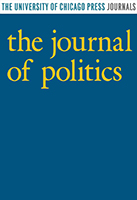In a recent Journal of Politics article, Daniela Campello and Cesar Zucco argue that Latin American voters credit and blame presidents for economic outcomes unambiguously exogenous to their policy choices, a claim that undermines broadly held understandings of how voters hold politicians accountable. While we concur on the importance of the global economy to politics in the region, we challenge their study on two grounds. First, we question their designation of economies as fitting a low-savings commodity-exporting profile as the key factor shaping the influence of world markets on presidential success. Second, we contend that the impact of the world economy on domestic politics depends instead on the degree of control exercised by national policy makers. In particular, the region’s unprecedented experiment with economic policy regimes informs voters’ assignment of responsibility to policy makers. A series of analyses provides support for our argument.
The World Economy, Political Control, and Presidential Success
The World Economy, Political Control, and Presidential Success
- Ryan E. Carlin,
- Publication Date
2020 - Website
- View Publication Information
 The College of Arts
The College of Arts